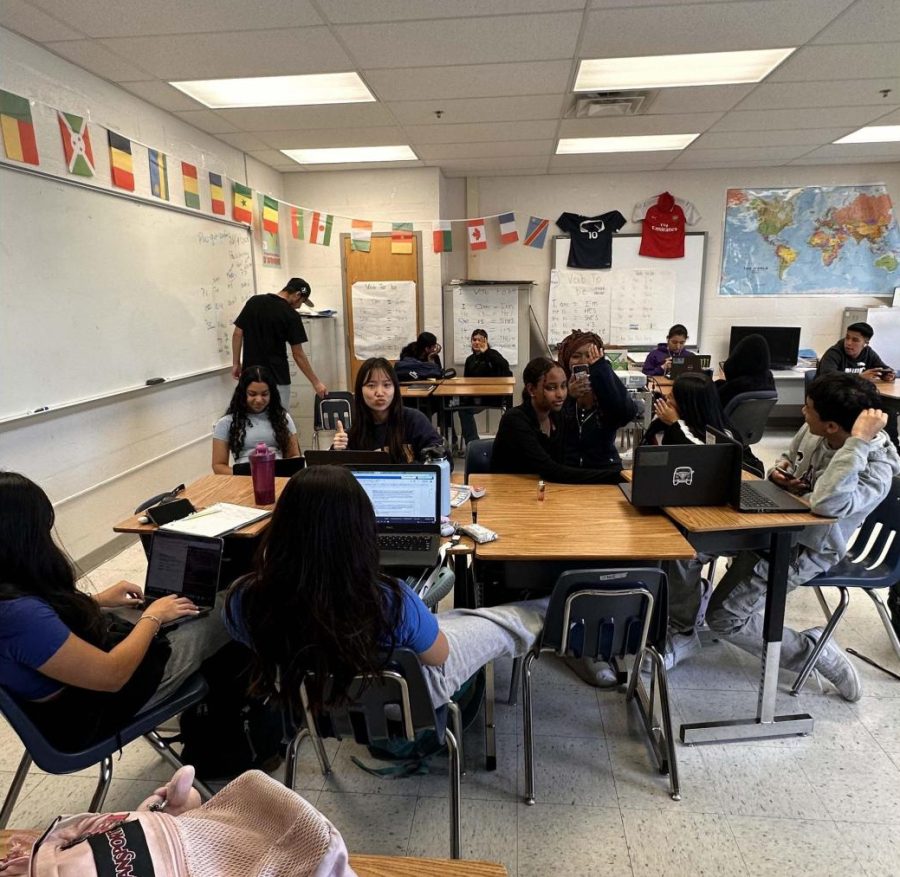Does Gen Z deserve the criticism?
Lewis advisory students, who all represent Gen Z, are comfortable with technology but not all are afraid to socialize, as seen here.
April 27, 2023
In the classroom, Gen Z students (those born between 1995 and 2012) are often criticized for their overuse and dependence on technology. Growing up as Gen Z we were introduced to social media and have always had access to worldwide information from the internet, whether we access it through phone or laptop.
Gen Z students’ dependence on technology can make them easily distracted in the classroom, as Lewis sophomore (and member of Gen Z) Jolina Henry observes. “Older generations didn’t have to deal with distractions such as electronics. I can see it being extremely difficult for us to have to pay attention to one certain subject every class period,” Henry said.
Honors US Government teacher Corey Illes also noticed that technology dependence is a key characteristic among Gen Z students. “Gen Z students want constant stimulation. Sometimes it is difficult to provide that level and amount of stimulation in a 90 minute class. It’s hard to compete with Instagram and TikTok,” Illes said.
For Gen Z students, using devices such as a laptop are more preferred instead of using papers to take notes. Based on Lewis students, Gen Z students have different ways to collect and record content when it comes to learning. Some students need the web to help them learn while others may read off directions from paper and pick up information instantly.
Sophomore Andres Roca-Aguirre believes that despite appearing distracted, students are learning. “A lot of kids teach themselves in different ways then you would see in a classroom,” Roca-Aguirre said.
Unfortunately, despite the benefits of technology, many students use technology to cheat and get answers. Are these students learning anything?
The recent pandemic permanently changed Gen Z students because we were isolated for a year and had no motivation to go through with being a student and learning. Gen Z students also experienced challenges to their mental health during the isolation of the pandemic closures, Gen Z students tended to limit their socialization and distanced themselves from others.
Both teachers and Gen Z students have different opinions on what makes it harder to teach this generation, yet both groups agree that education must adapt and upgrade.
Illes, who sees how easy it is for students to hide behind a phone and not engage in class, believes that schools and teaching must adapt to meet the needs of Gen Z. “It’s a challenge to teach them if the structure of our educational system is stuck in the past,” Illes said.
Students and teachers also both believe that Gen Z brings gifts such as their sense of social justice and desire to fight for what they believe in.
Illes sees the internet–the same tool that distracts students–as also helping bring about positive change in their world and the lives of others. “[Today’s] students are more aware of the world around them because of their access to the internet. They are more connected and are more curious than they were in the past,” Illes said.
Some good things about Generation Z is that we are open minded, we speak what we think, and we are not afraid to take risks as sophomore Bryan Biyoudi-Monthe argues. “We are able to share our feelings openly with our peers and community,” Biyoudi-Monthe said.
Roca-Aguirre also sees the strength in Gen Z’s voice. “No student is afraid to stand up and speak up about something. They are not afraid of something different and will try something with an open mind.”
The gifts that Gen Z offers academically is to participate in academic discussions and encourage others to pursue academic goals. “We’re more open to new ideas and easy to talk about our personal beliefs and opinions. That’s what makes us connect as a generation,” Henry said.
Gen Z gets a good reputation because of how using social media, they come together and fight for social justice issues. Older generations may fail to understand this generation because of the technological tools Gen Z uses. Gen Z students are not afraid to use their voice to spread the word through social media, and some members of the older generation might disapprove of their behavior. Older generations make it seem like Gen Z is creating a bad reputation, but we’re not. We’re creating a new future by displaying our actions on social media.
Gen Z are succeeding because of the changes that they helped bring about to make students who come from different cultures or religions feel safer about learning in a classroom environment.

